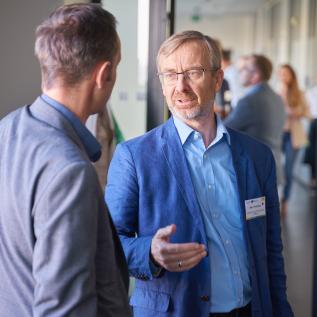Financing interregional innovation cooperation in Basque Country

The team of the Interreg Europe Policy Learning Platform organised a peer review with the Regional Government of the Basque Country, held in Bilbao on 5th and 6th November 2024.
As an innovation leader ready to experiment with new policy approaches, the Basque Country was looking for inspiration on how to finance interregional innovation through cooperation and realise cross-programme synergies in practice. Three strategic questions guided the co-creation sessions organised with the international peers and local participants:
The current state of affairs
Between 2001 and 2022, the annual investments of the Basque Government in science, technology and innovation nearly tripled from EUR 618 million (2001) to EUR 1.8 billion (2022), turning the Basque Country into one of Spain’s leading innovation regions. The innovation agenda of the region is strongly driven by an outward-looking dimension, actively engaging the Basque Country in euroregional collaboration with France and European innovation initiatives. Thanks to the region’s diverse innovation ecosystem, supported by strong clusters and a dynamic regional development agency, the Basque Country is an important partner in EU programmes, the Interregional Innovation Investment Instrument (I3), the S3 Thematic Specialisation Platforms, the Vanguard Initiative, and Euroclusters.
Equally, the European framework encourages the interregionalisation of regional innovation ecosystems:
- Regulation (EU) 2021/1060 of the European Parliament and of the Council of 24 June 2021 requiring regional and national cohesion policy programmes to embed “interregional, cross-border and transnational actions with beneficiaries located in at least one other Member State or outside the Union, where relevant”
- The policy framework of macro-regional strategies
- The Commission Notice “Synergies between Horizon Europe and ERDF” of 4 November 2022, offering concrete pathways for cross-programme synergies.
The experimentation with concrete interregional innovation initiatives, however, outlines the need to find solutions for practical implementation challenges, and to create additional incentives for SMEs and other innovation stakeholders to sign up.
Peers from across Europe
Alongside Thorsten Kohlisch, Arnault Morisson, and Marc Pattinson, from the Policy Learning Platform, six excellent peers participated in the peer review:
- Anders Bergström, Norden Association, Stockholm Region, Sweden
- Esa Kokkonen, The Baltic Institute of Finland / Tampere Region, Finland
- Manuel París Lestón, Innovation and Project Manager, Innovation Agency of Galicia, Spain
- Mieszek Jagiello, Brandenburg Ministry of Finance and for European Affairs, Germany
- Murad Biçici, Province Gelderland, The Netherlands
- Paolo Rosso, Emilia Romagna Region, Italy
Additionally, three European policy experts joined the policy learning sessions, bringing in the European policy perspective on embedding cooperation and cross-programme synergies:
- Silvia Alvares Santos, European Commission, DG Regio, Unit G1 “Smart and Sustainable Growth”
- João Labareda, European Commission, DG RTD, Unit A.5 “Innovation Policy & Access to Finance”
- Stoyan Kanatov, Interact Programme, service delivery – cooperation actions and support for IJG
During both days of the peer review, the peers and experts shared their experiences with the Basque host, giving emphasis to concrete and practice-proven approaches to embedding cooperation.
Equally, the regional innovation community of the Basque Country actively participated in the sessions, bringing in their extensive knowledge of the local context. Surely, the contributions of the Basque Business Development Agency (SPRI), Bilbao Port Lab, the Basque Energy Cluster, the region’s Research and Technology Alliance (BRTA), the Euskampus Foundation, the Food and Marine Research Centre (AZTI) and the Euroregion Nouvelle-Aquitaine/ Euskadi/ Navarre served as inspiration for the peers, too.
Hence, driven by the spirit of co-creation, the interregional teamwork on the spot resulted in a jointly elaborated set of targeted policy recommendations, offering concrete suggestions for the way forward in the short- and long-run.
Rounding off the peer review, the participants had the honour of presenting the results of their work to the Minister of Finance of the Basque Country, Mr. Noël d'Anjou Olaizola, thus raising awareness of the opportunities for developing interregional actions at the highest level and preparing the ground for the uptake of the recommendations in the weeks and months ahead.
Key Recommendations
- Regions have political, legislative and financial powers to drive competitiveness and prepare for the new cohesion agenda (post-2027) and encourage synergies between the future European Framework Programme for Research and Innovation (FP10) and place-based innovation.
- However, policymakers must innovate in policy design and implementation ! Innovation is not only the job of companies !
- Consequently, programmes for innovation require financial management flexibility to offer easy access for companies (SMEs) and react to emerging needs and regional priorities (missions).
- In practical terms, ensure the allocation of funds for delivering on cooperation and synergy objectives. In Galicia, for instance, EUR 20m have been earmarked for a variety of actions, including : vouchers supporting the preparation of EU project proposals, “Seal of Excellence” projects, co-funding for Galician stakeholders in Horizon Europe projects, as well as for transnational R+D+I projects, notably to implement the cross-border S3 strategy with their neighbouring Portuguese partner region Norte.
- Mobilise your innovation ecosystem actors, especially your clusters as facilitators to prepare SMEs to access finance and engage in interregional cooperation.
- Encourage the access to cascade funding calls and opportunities from Horizon Europe, as currently illustrated by pilot actions deployed in Brandenburg and Emilia-Romagna.
- Strategically, macro-regions and European initiatives (cross-border and interregional networks) offer strategic frameworks for tackling challenges through the alignment of funding, for instance via synchronised interregional calls, such as the Innovation Express. Instead of setting short cut-off deadlines, open funding models may better allow for thorough project preparation, if applied by all participating regions.
- Hence, use the macro-regional framework with your stakeholders – cluster managers, networks, SMEs, RTOs – to define missions addressing common Grand Societal Challenges and other innovation needs.
- Equally, build on S3 priorities to inspire and drive interregional cooperation (examples of cross-border RIS3 with Nouvelle Aquitaine in France and neighbouring Spanish regions).
- At the same time, use communication and success stories to inspire policymakers and innovation stakeholders – keep in contact with the peers to share good practices and deepen the established collaboration and identify future project based cooperation, for example via the Regional Innovation Valleys under Horizon Europe.
The host’s policy challenges, and all the peer suggestions will be available shortly in the follow-up report.
¨Interregional cooperation is a priority for the Basque Government. Thanks to the peer review exercise we have been able to deepen into other regions mechanisms to finance European interregional projects. One of the conclusions to consider is that introducing a certain degree of flexibility in our current funding schemes is necessary if we want to be able to innovate in the future, and to finance common projects together with other European partner regions.¨

Peer review publication
Find more information on the methodology and experiences of previous beneficiaries in our publication.

Apply for a peer review
Start your peer review application process today and find solutions to your policy challenge with our expert and peers!
